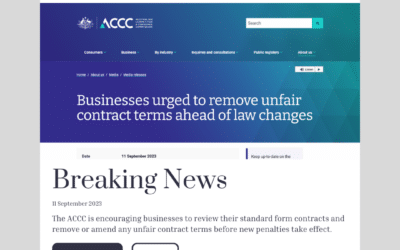
After much discussion throughout 2019 and 2020, the Treasury Laws Amendment (Registries Modernisation and Other Measures) Act 2020 (Cth) (the “Act”) received Royal Assent on 22 June 2020.
The Act introduces and enforces a new Director Identification Number (“DIN”) regime into the Corporations Act (Cth) 2001.
While there’s a little bit of time for directors of companies to get acquainted with these new requirements, it’s important to know and understand what this might mean for you, as a current director or someone who might be considering becoming a director over the coming years.
There is a bit of time, but it’s best to know what is needed right up front. This new DIN regime starts on 22 June 2022.
What is a Director Identification Number (DIN)?
All Directors of companies will need to apply for and successfully obtain their own unique number, or DIN, as a form of identification and activity tracing.
This number will be permanently assigned to them regardless of what company or companies they may be involved with at any point in time, or over time. Making it easier for both companies and authorities to identify who is involved where – and reducing the ability to illegally create and use fictitious identities.
A director is only permitted to apply for one DIN that stays with them and even if that person ceases being a director.
Why have Director Identification Numbers been introduced?
The idea behind introducing a DIN number to the Corporations Act 2001 was first recommended in 2015 by the Productivity Commission’s final report into Business Set-up, Transfer and Closure.
The overall idea behind these DIN requirements is to improve the integrity of corporate data, we do now live in the “data era” after all. This is commonly spoken about in the press and in corporate circles.
So overall, the DIN will help in detecting, deterring and disrupting illegal ‘phoenixing’ activities.
As another benefit of this new DIN regime, there is a goal to make it much harder for directors to illegally continue running a business that has previously been deliberately liquidated to avoid paying outstanding debts and obligations – as there will be better traceability and transparency. Perhaps this is something that has arisen in the midst of some anticipated challenges foreseen to perhaps be arising from the global COVID 19 pandemic.
This DIN will also hopefully help in creating more efficiency for administrators and liquidators to make things easier during insolvency situations. DIN’s might also be a tool for assisting with some extra security security and privacy for company directors.
The introduction of the DIN regime is also a part of a larger project, The Modernising Business Registers program, which aims to bring 32 different business registers into a single system – with the aim of simplifying and reducing the regulatory burden for business.
When will I need to apply for a DIN?
The new regime commences on 22 June 2022. There will however be a 12-month transitional period, where anyone appointed as a director within this time will have 28 days to apply for a DIN.
Following this transitional period, all directors must apply for a DIN before being appointed as a director.
For existing directors however, the official date that they must apply for a DIN has not yet been specified or announced. We highly recommend you keep an eye out for any announcements to avoid any issues with non-compliance.
What happens if I don’t apply for a DIN as a director?
If you fail to apply for and comply with the DIN regulations once they officially come into force, you might potentially face both civil and criminal penalties.
For example, if you are a director of a CATSI organisation and don’t apply for a DIN in that time, you can be facing some serious penalties and civilly the amount of up to $200,000 as a penalty imposed by the regulator.
Providing false information when applying, or attempting to apply for more than one DIN, will also encounter penalties.
How can AMK Law help?
The introduction of Director Identification Numbers will certainly help to provide greater transparency for directors, companies and regulators – therefore reducing the opportunity for illegal company activity. That, can only be a good thing, as it creates more confidence and fairness for everyone.
Feel free to reach out so we can help you if you need advice about the DIN requirements, or if you are facing penalties from one of the regulators involved.
However, many deadlines and details have not yet been announced, which can be a little unsettling, particularly if you’re an existing director. It’s important to remain up to date, as more information comes to hand.
Our highly experienced lawyers, however, always remain on top of changes. We can keep you informed of the required deadlines that you need to meet and the processes to follow, within the Corporations Act 2001. Thus, ensuring you and your company are fully compliant at all times.
Should you have any concerns or questions around the new DIN regime, you’re welcome to get in touch with our friendly team for personalised advice.
Important disclaimer: The material contained in this publication is of a general nature only and it is not, nor is intended to be legal advice. If you wish to take any action based on the content of this publication, we recommend that you first seek professional legal advice.
AMK Law acknowledges the Traditional Owners of the land on which we are fortunate to live and work. We pay our respects to Elders, both past and present and further acknowledge the important role that Indigenous people continue to play within our communities.

Book Your Appointment
Related Articles
Privilege Under Pressure: Insights from the Optus Case
A Shifting Legal Landscape Today's businesses are under constant threat from cyber attacks, making it increasingly important to understand how they can legally protect their private conversations. Legal professional privilege is a fundamental rule that keeps the...
Ticketek’s $500K Fine: A Legal Perspective on Email Compliance
In the constantly changing world of digital communication, email marketing remains a vital way for businesses to connect with their audience. However, it's crucial to manage this tool with care and attention to legal obligations. The Australian Communications and...
Navigating the Waters of Unfair Contract Terms in Australia
As a small business owner in Australia, you might have come across the recent updates to the Australian Consumer Law regarding unfair contract terms. If it seems a bit complex, don't worry! We're here to simplify it for you in clear terms. Unfair Contract...




